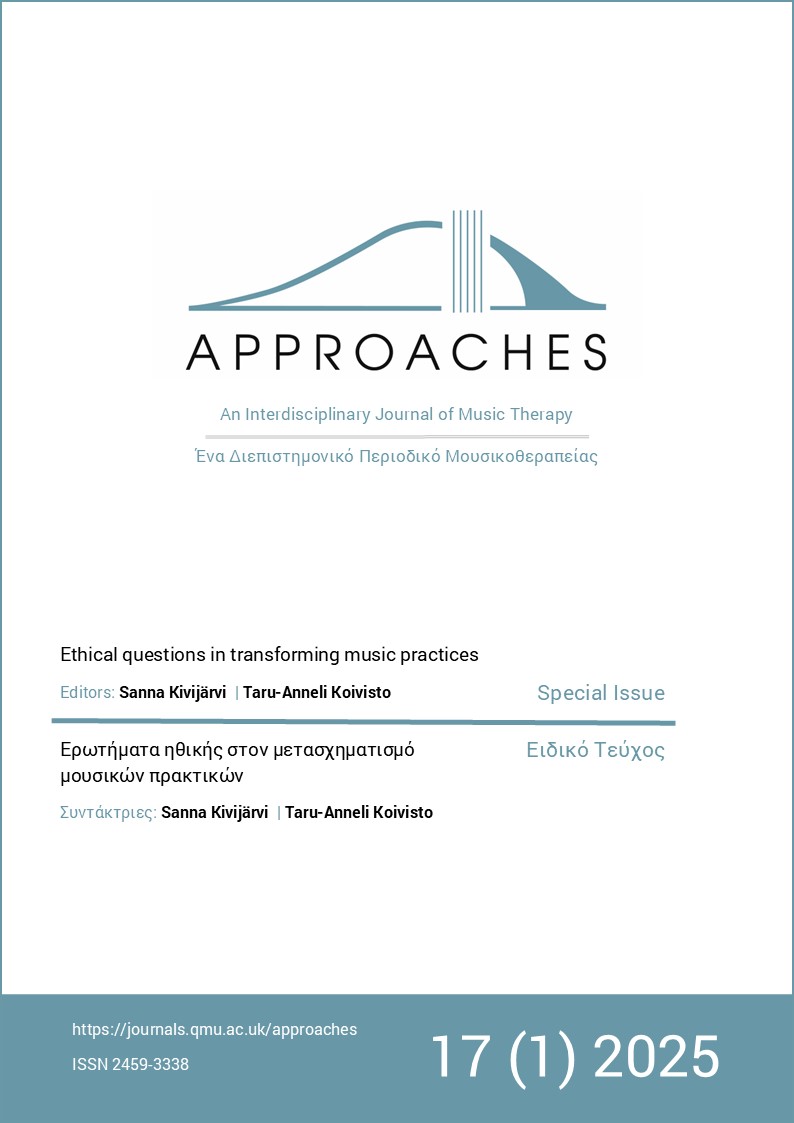Αναπνέοντας πόλεμο, ονειρεύοντας σύνδεση: Ο διάλογος ως ηθικόθεμέλιο για το συνεργατικό έργο Παλαιστινίων και Εβραίων μουσικοθεραπευτριών στο Ισραήλ
DOI:
https://doi.org/10.56883/aijmt.2025.615Λέξεις-κλειδιά:
μουσικοθεραπεία, εμπόλεμη ζώνη, ηθική, πολιτισμικά-ευαισθητοποιημένος διάλογοςΠερίληψη
Μια συλλογικότητα έξι Παλαιστινίων-Αραβισσών και Εβραίων μουσικοθεραπευτριών, ερευνητριών και εκπαιδευτικών, που είναι Ισραηλινές πολίτες, συγκεντρώθηκε για να διερευνήσει και να ενισχύσει τις ιδιαίτερες ανάγκες των Αραβισσών μουσικοθεραπευτριών στο Ισραήλ. Ως πρωταρχικό ηθικό βήμα, ξεκινήσαμε μια συμμετοχική μελέτη, εμβαθύνοντας στις προσωπικές και επαγγελματικές μας εμπειρίες ως μουσικοθεραπεύτριες σε μια χώρα που επηρεάζεται βαθιά από μακροχρόνιο τραύμα και σύγκρουση. Όλα τα μέλη της ομάδας συμμετείχαμε σε μια ομάδα εστίασης διάρκειας 90 λεπτών, σχεδιασμένη ως ημιδομημένη συνέντευξη, με ένα μέλος να λειτουργεί ως συνεντεύκτρια και ένα άλλο ως μεταφράστρια. Η συνέντευξη ηχογραφήθηκε και απομαγνητοφωνήθηκε. Τρία από τα μέλη της ομάδας, Εβραίες και Αράβισσες, ανέλυσαν τα δεδομένα για να διασφαλιστεί η διασταύρωση των ευρημάτων. Μετά από τρεις διαδοχικούς γύρους θεματικής ανάλυσης, μια συζήτηση μέσω Zoom διάρκειας 90 λεπτών επιβεβαίωσε την ανάδυση πέντε βασικών θεμάτων: (1) ασαφή όρια που προκαλούν την ηθική σκέψη, (2) διαμορφωμένοι από τον πόλεμο, (3) κατακερματισμένες ταυτότητες, (4) πολιτισμική μοναξιά, (5) η μουσική στη θεραπεία – ανάμεσα στην πόλωση και την κοινή ταυτότητα. Αρκετά θέματα περιλάμβαναν και υποκατηγορίες. Τα ευρήματα κοινοποιήθηκαν σε όλα τα μέλη της ομάδας, τα οποία παρείχαν επιπλέον σχόλια. Η συζήτηση αναδεικνύει τις βαθιές επιπτώσεις του πολιτισμικού διαχωρισμού και της ιεραρχίας σε όλα τα μέλη της ομάδας, την έλλειψη αυθεντικής και πολιτισμικά βασισμένης επαγγελματικής ανάπτυξης, καθώς και ένα κενό στην πολιτισμικά ευαισθητοποιημένη επαγγελματική ηθική για τις Παλαιστίνιες-Αράβισσες συμμετέχουσες. Αντιμετωπίσαμε το ηθικό δίλημμα της διατήρησης πολλαπλών αληθειών ως Ισραηλινές μουσικοθεραπεύτριες, ενώ ταυτόχρονα αγκαλιάσαμε την ελπιδοφόρα ιδέα ότι η μουσική μπορεί να λειτουργήσει ως ενοποιητικό μέσο, να γεφυρώσει πολιτισμικά χάσματα και να προάγει μια πλουραλιστική προσέγγιση στη μουσικοθεραπεία.
Λήψεις
Δημοσιευμένα
Τεύχος
Ενότητα
Άδεια
Πνευματική ιδιοκτησία (c) 2025 Efrat Roginsky, Tamar Hadar, Nihal Midhat-Najami, Buran Saada, Rozan Khoury, Maimounah Hebi

Αυτή η εργασία είναι αδειοδοτημένη υπό το CC Αναφορά Δημιουργού – Μη Εμπορική Χρήση – Όχι Παράγωγα Έργα 4.0 4.0.




